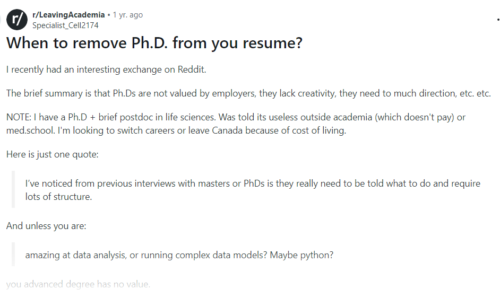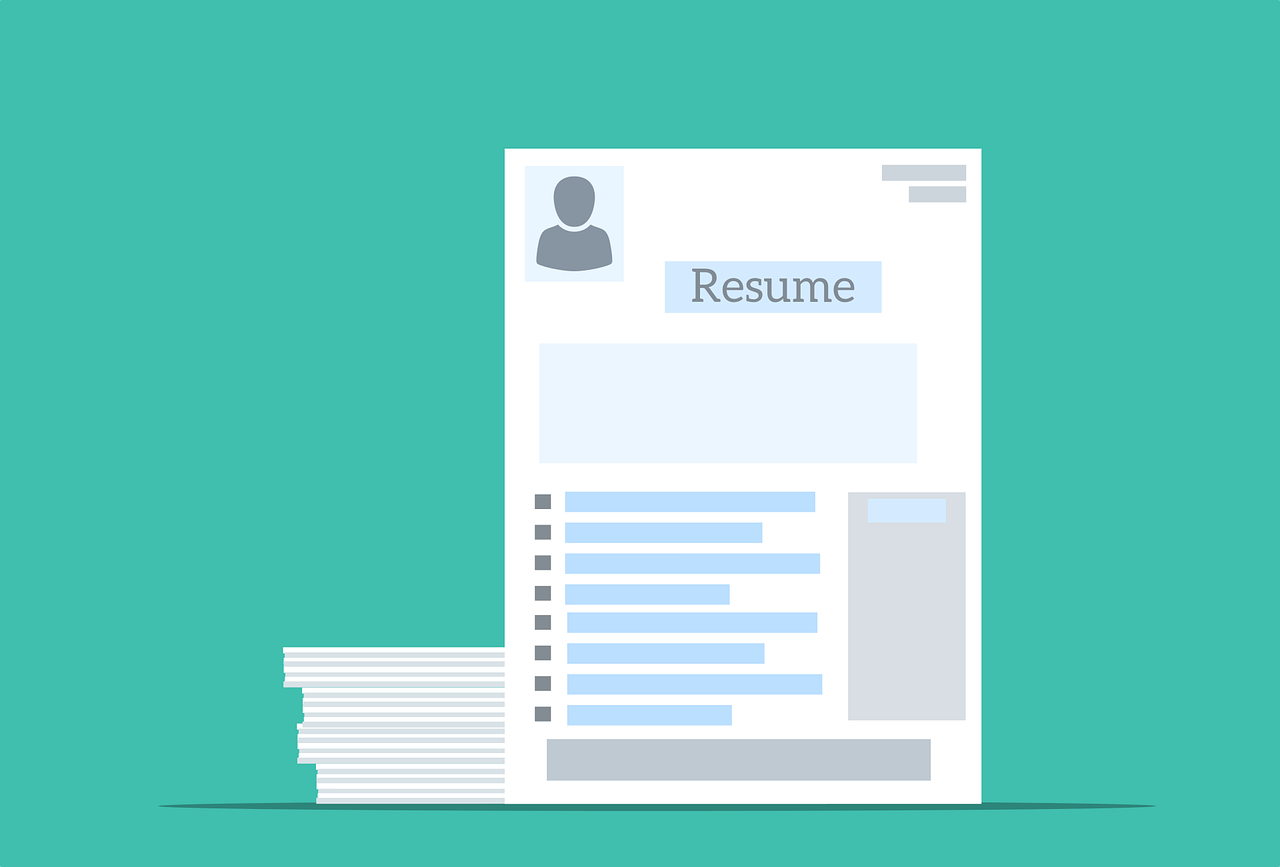When transitioning from academia to the industry, some academics grapple with the question of whether to include their PhD degree on their resume. For most jobs outside of research and leadership positions, a PhD is not necessarily a requirement. In terms of the US population, only 4.5% of people have a PhD in 2018 according to the US Census.
There is fear that hiring managers and recruiters will perceive them as overqualified or underqualified and completely overlook their application.
For example, this Reddit post among others asks this question “When to remove Ph.D from your resume.

In an effort to provide wider perspectives about leaving academia, I interviewed Danny O’Connel, a National Digital & Creative Marketing Recruiter (Technical Recruiter) who works for TEKsystems. There is often a lot of misinformation that occurs on places like LinkedIn and Reddit, therefore, having a recruiter’s expertise can help provide clarity for job seekers from someone experienced in the interview process.
Can you tell me more about yourself? Why did you choose to be a technical recruiter?
Processor for a veterans mortgage company. The reason I transitioned over to recruiting was because I found that mortgages probably wasn’t the right career path for me and wasn’t as fulfilling as I’ve found recruiting to be. When I graduated college I always wished I had a guide or expert to tell which jobs were out there and what might best fit what I’m looking for.

Being able to be that resource for so many in the IT space has been super rewarding! I found that it was super hard to get a job off of LinkedIn, Monster, or any other service because there are so many candidate applications and resumes can get lost in the shuffle. It’s much easier/better to have a personal connection with someone who has your best interest in mind and knows what you’re looking for rather than throwing your resume in a portal in hopes of an interview request.
How many people with a PhD or those with advanced graduate experience have you interviewed?
It’s hard to say how many folks I’ve talked to with PhD’s because a lot of the roles I’ve recruited for in the past haven’t required them, but there are definitely positions where it is beneficial and can grab the attention of a hiring manager!
Based on your experience, should academics include their degree “PhD” in their resume? Why or Why Not?
I think you should absolutely include your PhD in your resume! You worked hard to obtain it so you should let people know that you have that degree under your belt. As I mentioned prior, it can also be an advantage or a leg up in the interview selection process or even an eventual job offer. Most hiring managers we speak to are very impressed when someone has their PhD.
Danny O’Connel – National Digital & Creative Marketing Recruiter
Overall, do you see a PhD as a plus?
I think having a PhD if you’re financially in a place to obtain it is always positive. It definitely grabs the attention of hiring managers if it’s listed in your resume and can unlock access to higher level positions. However, if you aren’t sure whether or not you want to obtain your PhD, I would suggest taking a look at the jobs you want to see if they require this level of degree. In my experience, we don’t see this requirement too often as I recruit in the Digital Marketing space where positions vary in skill sets. The Medical space is much different and I would highly recommend having a PhD for this career path.
For those who do not make the cut for a role, what are they usually missing in their application?
There can be a number of reasons candidates get disqualified from positions. In order to make the cut for an interview, your resume almost always must match 90% of what the job description has listed. Nowadays, bigger companies are utilizing AI to vet resumes before humans so your resume needs to be in line with the role you’re applying for. You will also need to be able to speak to your skills accurately and effectively throughout interviews.
If you are pushed to a panel/second-round interview, this is most likely where you will be judged on whether or not you will be a mutual cultural fit for the company. Sometimes personalities don’t mesh or the candidate finds they won’t like the daily operations/team and that’s good to figure out (that’s what the interview is there for).
In this economy, we’ve seen a lot of outside issues occurring that have nothing to do with how the candidate interviews. For example, the role can be closed because the company lost budget or someone internally decides they want the position now. There are a lot of factors that need to go right in order to secure a new job which is why there are so many people getting told no rather than yes.
Are PhDs generally overqualified or underqualified for industry roles?
Overqualified, but it’s better to be overqualified. The only time managers will deny someone for being overqualified is if the role is only requiring below 5 yrs of experience and the candidate has 10+. This is also at their discretion and could ultimately change case to case.
Are you currently hiring for a role that might require a PhD?
I am not 🙁
[From a LinkedIn exchange after the interview questions were sent].
The job market as a whole has been extremely volatile. 2023 was bad and 2024 hasn’t been much better. It usually swings after an election year so we’ll see what happens in Q4 and 2025. Most companies start hiring in Q4 in preparation for the new year as they sometimes have a surplus to hire.
How should readers reach out to you, what’s the best way to approach recruiters generally?
LinkedIn is great!
Recommended Books For Writing a Resume
[Author’s Note: These are affiliate links that support the site]
- Resume 101: How to Write an Effective Resume, LinkedIn Profile, and Cover Letter
- How to Write the Perfect Resume: Stand Out, Land Interviews, and Get the Job You Want
- Resumes For Dummies
- Job Interviewing For Dummies

Ryan Collins PhD is an SEO Strategist at Go Fish Digital. Ryan completed his PhD in Media Arts and Sciences at Indiana University Bloomington in 2021. During his time at Indiana University, Ryan eventually pivoted into a career in SEO and Digital Marketing after having informational interviews with working professionals in SEO, working on side projects, and gaining industry experience.
